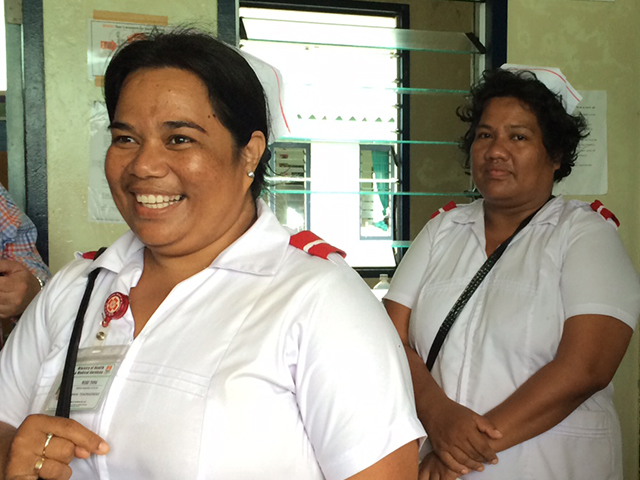
An innovative new pilot project on integrated healthcare waste management in Tarawa, Kiribati will ensure that the island nation's largest hospital has the necessary capacity and resources to implement a cost-effective and self-sustaining healthcare waste management system.
The initiative is being jointly supported by the Global Environment Facility – Pacific Alliance for Sustainability (GEF-PAS) Pacific POPs Release Reduction Project and the European Union funded Pacific Hazardous Waste project (PacWaste). These projects are executed and implemented, respectively, by the Secretariat of the Pacific Regional Environment Programme (SPREP).

SPREP's Director of Waste Management and Pollution Control, Dr David Haynes, explains that there are many synergies between the two projects:
"The focus of the Pacific POPs Release Reduction project is to minimise the release of toxic Persistent Organic Pollutants (POPs) and the PacWaste project aims to improve the management of hazardous waste in the Pacific region. Given that improper incineration is a key contributor to the release of POPs, the Kiribati pilot scheme's focus on improved healthcare waste management through best-practice incineration techniques fits very nicely within the scope of both projects."
In April 2014, PacWaste conducted healthcare waste management baseline surveys in 15 countries, including Kiribati, through which information was collected on waste management processes, from ward-level waste generation through to treatment and disposal.
The Kiribati survey identified an urgent need for improved storage, treatment and disposal solutions for healthcare waste at the Tungaru Central Hospital, and also noted that, without intervention, the sizeable stockpile of untreated healthcare waste at the hospital would continue to grow.
To alleviate the problem of waste generation exceeding disposal capacity, the PacWaste project has purchased a new high temperature healthcare waste incinerator for the hospital and specialised healthcare waste management training for hospital staff has commenced.
Following the recent completion of two days of healthcare waste training at the hospital, Trainer, Dr Trevor Thornton, praised the participants for their high level of enthusiasm and engagement:
"I was very impressed with the dedicated staff who enthusiastically participated in the training programme. A number of participants noted that the workshops opened up a valuable dialogue between the individuals who are involved in waste disposal (such as incinerator operators) and the hospital and health clinic employees who generate the waste (such as nursing staff). This was great to hear as efficient healthcare waste management systems hinge on clear and open communication between the key players."
The training and equipment purchase has been complemented by the employment of a full-time Healthcare Waste Officer and a part-time Incinerator Officer through the Pacific POPs Release Reduction project.
These actions will ensure that Tungaru Hospital has the capacity and resources to implement an integrated and self-sustaining healthcare waste management system.

Mr Tebikau Tibwe, Acting Deputy Director, Public Health Services, believes that the pilot project which features the development of a healthcare waste management system, will improve outcomes for both the people and environment of Kiribati:
"Through the provision of specialised training on waste separation and infection control procedures, Personal Protective Equipment (PPE), signage, secure storage systems, a new high temperature incinerator and extra human resources, our largest hospital will be able to effectively and safely handle its healthcare waste. It's a great step forward for both the people and the environment of Kiribati."
The Pacific POPs Release Reduction project is co-funded through the Global Environment Facility - Pacific Alliance for Sustainability (GEF-PAS) and Agence Française de Développement (AFD). It is executed by SPREP, and implemented by the United Nations Environment Programme (UNEP) and the Food and Agriculture Organization (FAO).
PacWaste (Pacific Hazardous Waste) is a €7.85 million, four year project supported by the European Union and implemented by the Secretariat of the Pacific Regional Environment Programme (SPREP) to improve regional hazardous waste management across the Pacific. PacWaste has four focus areas - asbestos, E-waste, healthcare waste and integrated atoll waste management.